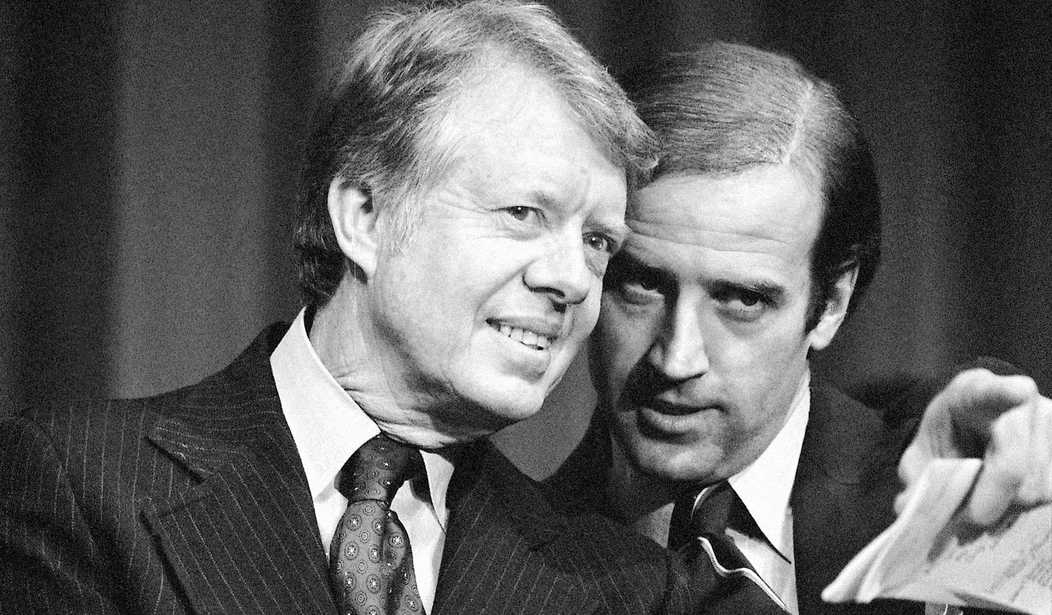Never speak ill of the dead, the old saying goes, but Jimmy Carter, 98, still lives. The former holder of the Worst President in History title “had a good day” on Sunday, according to his niece, Leanne Smith. “I dropped broccoli and cheese soup off to be delivered to the house, because he’s eating and talking…so it is amazing. He’s still got some time in him.” So there is still time to remind Americans of just how disastrous his presidency really was, and how we’re still suffering its ill effects.
Jimmy Carter’s appeal to voters in 1976 was that he was not qualified to be president in the conventional sense. He was not and had never been a senator or congressman. He had served in the navy (but was no war hero). For one term, he was governor of Georgia, where he attracted little attention before he began his run for president. In the aftermath of Watergate, when voters had had their fill of corruption from Washington insiders, Carter’s slight résumé was a selling point. He was just a humble peanut farmer with a toothy grin, a devout Christian coming to Washington to clean up the place.
Once he won the Democrat Party nomination, he was virtually assured of the presidency. Republicans in the aggregate were blamed for Watergate, and Gerald Ford had dispelled the goodwill that accompanied his accession to the presidency when he pardoned Nixon. Carter began with a substantial lead over Ford in the polls: in mid-July, he led by 62% to 29%. Unexpectedly, however, he turned out to be an exceptionally weak candidate. With a huge lead, the media in his pocket, and considerable popular ill will toward the opposition party, which was itself deeply split, Carter couldn’t seal the deal. The president slowly and steadily began closing the gap. Even when Ford shot himself in the foot — as he did in his debate with Carter on October 6, 1976, when he declared that “there is no Soviet domination of Eastern Europe and there never will be under a Ford administration” — he lost little ground. Carter won, but only by a hair, and the weak candidate set out to become a weak president.
During his one term as president, Carter fought the “energy crisis” by scolding Americans for using too much energy and overseeing a proliferation of government regulation in order to make Americans become more energy-conscious and less wasteful. But the whole endeavor was built on sand: there was actually no energy crisis. The world’s oil reserves did not run out in the 1980s, as had been predicted, and not because Carter saved the day by winning what he called the “moral equivalent of war.” Carter only made the real problem worse: oil companies were so beset with restrictions and regulations that they couldn’t take adequate steps to find new oil supplies. Carter’s successor, Ronald Reagan, changed that, and the days of the energy crisis were over, at least until apocalyptic climate hysteria of a different kind became the centerpiece of later Democratic presidents’ efforts to assert even more federal control over the lives of Americans.
The Department of Education is another Carter failure. Despite pouring tens of billions into U.S. public schools, student performance has not improved; just the opposite has happened. Even worse, the federal bureaucrats who oversee the Department of Education have created national standards and curricula that are marred by a pronounced Leftist bias. This has taken the form today of a manic attention to race and diversity, at the expense of giving children a basic education.
Carter has received a great deal of praise, as well as a Nobel Peace Prize, for the Camp David Accords, but in reality, they accomplished little. The final agreement had Israel making substantial territorial concessions in exchange for promises that Egypt would not attack Israel, which the Egyptians kept because U.S. foreign aid was made contingent upon peace. Other than that, the Accords brought no peace to the Middle East. They legitimized the existence of the “Palestinian” people, a propaganda invention of the KGB in the 1960s, and advanced the claim that Israel was occupying territory to which only Israel actually had a legitimate claim. Carter, after his presidency, has written several books about the Israeli-Palestinian conflict that have brought him charges of anti-Semitism; the deep bias of the Camp David Accords strongly suggests that, even at that time, he had an animus toward Israel.
Related: BREAKING: Jimmy Carter Receiving Hospice Care
Meanwhile, the Iranian hostage crisis, as well as the abject failure and apparent amateurishness of the rescue operation, epitomized the Carter administration’s impotence in the face of repeated provocations from the nascent Islamic Republic of Iran. In a very real sense, Jimmy Carter is the Father of the Islamic Republic of Iran, a rogue regime that still viciously oppresses its own people while allying with and financing jihad terror groups around the world.
Jimmy Carter was as sanctimonious as he was inept. America is still paying the price for the damage he wrought during his presidency. He effectively lost his bid for reelection on July 15, 1979, when he scolded and hectored Americans in what came to be known as his “malaise” speech, although he did not use that word. “It’s clear,” Carter claimed, “that the true problems of our Nation are…deeper than gasoline lines or energy shortages, deeper even than inflation or recession.” What he did not address was the extent to which his maladroit handling of the presidency was responsible for that crisis. The malaise began to lift when he was voted out of office. Only Old Joe Biden has ensured that Carter will not be thought of as our worst president ever.










